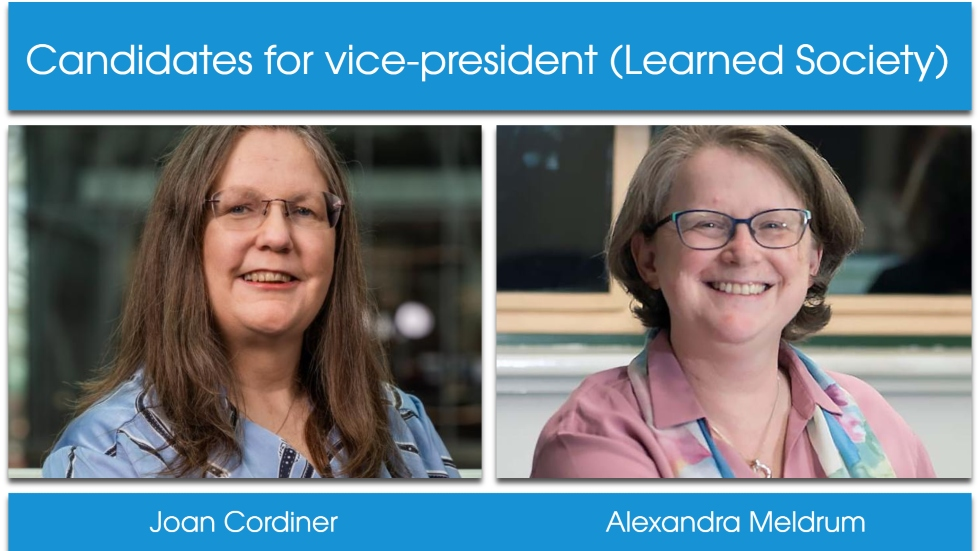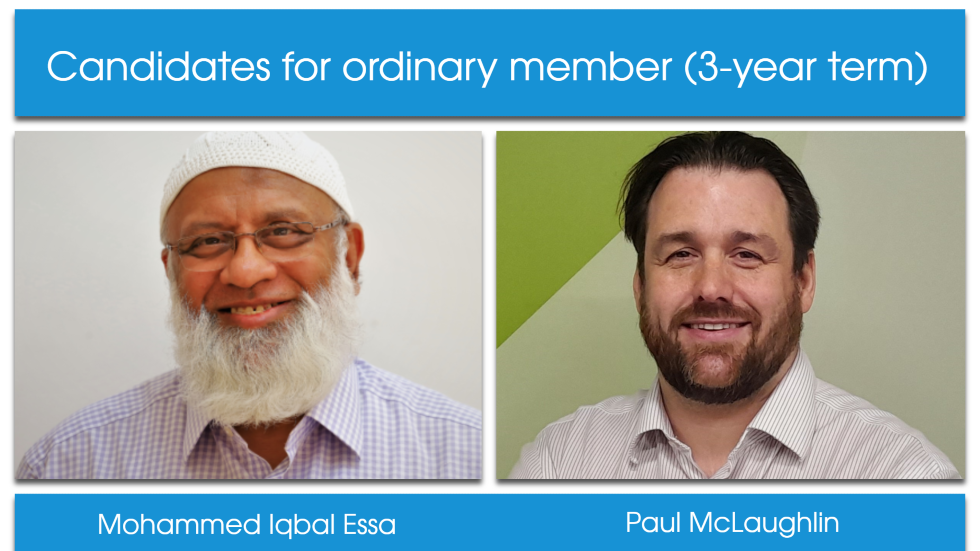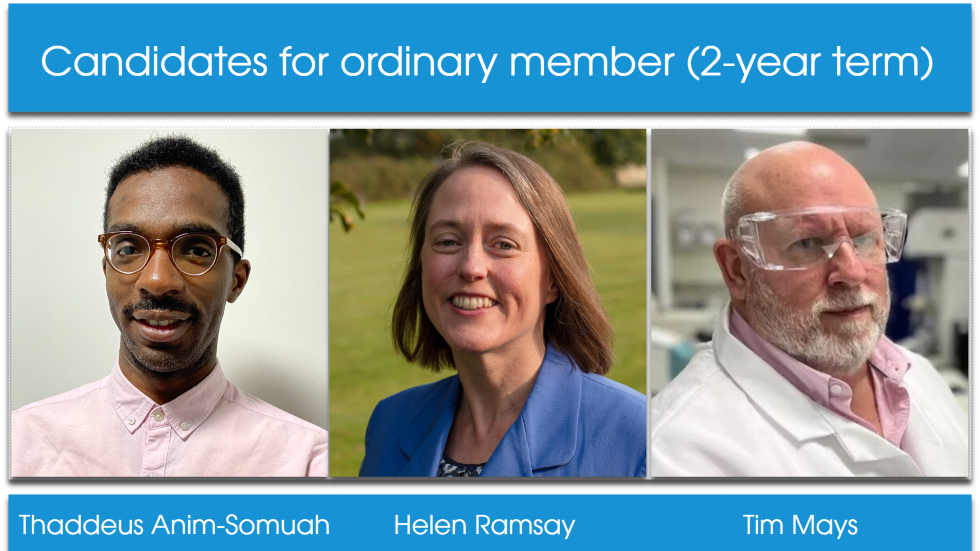Who Will Win Your Vote in the Trustee Elections?
With voting set to close at 09:30 BST on 16 May, you are running out of time to help decide IChemE’s contested trustee elections. We asked the seven candidates to introduce themselves and their ambitions for IChemE
IF YOU haven’t yet voted in the IChemE trustee elections, then you have until 09:30 BST on 16 May to cast your votes. There are seven candidates in total: two are running for election as vice-president (Learned Society); two others for the position of ordinary member (three-year term); and another three for ordinary member (two-year term). To help provide additional insight, we asked the candidates to introduce themselves and share their views on the future direction of the Institution.



Tell us about some of the ways in which you’ve already contributed to IChemE ahead of this election
Joan Cordiner FREng CEng FIChemE (standing for vice-president – Learned Society)
Joining IChemE in 1987, I have contributed several articles, from the first in 1988, and was on several committees in the 1990s and early 2000s. I was the first female chair of the Fluid Separation Subject Group committee and represented IChemE at the (EFCE) Distillation and Absorption Panel. I have also represented IChemE at several meetings over the years with EFCE, the American Institute of Chemical Engineers (AIChE), professional engineering institutions, and the Royal Academy of Engineering. During my 16 years in the US, I supported IChemE activities where possible and since being back in the UK I have been on the Andrew Medal panel, representing IChemE on the National Engineering Policy Centre along with being on the Sheffield Member Group committee. I have given a number of IChemE webinars or keynotes at member group AGMs, particularly during the Covid pandemic, supporting events for potential Fellows and members, and on topics including careers, women in engineering, diversity, and ethics.
Alexandra Meldrum FIChemE (standing for vice-president – Learned Society)
A member since university, I began volunteering in 2009 as a university accreditation assessor. I strengthened my involvement when I joined the Learned Society Committee (LSC) as a founding member in 2019, as subject area lead for education, innovation and research, and delivering the digitalisation project. As the elected vice-president (Learned Society) since 2021, I chair the LSC and the Learned Society Forum, and further reinvigorated Learned Society for more focused, member-involved activities. My policy expertise has resulted in doubling the policy output advice from our members between 2021-2023, and I led the production of the member-consulted Technical Challenge Report, due to be published on May 23.
Mohammed Iqbal Essa FIChemE (standing for ordinary member – 3-year term)
Whilst working for the Health and Safety Executive, I joined the IChemE North West branch. I subsequently led the branch for six years, promoting chemical engineering within local schools, colleges, and universities. I later joined the UK Hazards Technical Committee to help organise events for international audiences and assessed technical papers for Hazards Conferences for nearly 15 years. I also presented papers at several conferences, alongside the late Trevor Kletz and other eminent international authors. In 2011, I was appointed chair of IChemE’s Loss Prevention Bulletin for six years. I am still on the panel. In 2023, I joined the Learned Society Forum (LSF) where I continue with my lifelong commitment to the advancement of IChemE. Furthermore, I mentor engineers to attain their Chartership.
Paul McLaughlin CEng MIChemE (standing for Ordinary Member – 3-year term)
I was a committee member of the Teesside Members Group, spending time as treasurer. After moving to southwest England I helped restart the local members group and am currently treasurer here too. From 2020 to 2023 I represented UK South West in Congress. This gave me the opportunity to discuss areas of concern for chemical engineers, providing a range of voices to keep the trustees aware of the views of members. I was a Competence and Commitment report reviewer.
Thaddeus Anim-Somuah CEng FIChemE (standing for ordinary member – 2-year term)
My volunteering journey with IChemE started as an undergraduate student when I joined the Board of the North West Member Group committee. Since then, I have been hands-on in activities such as a STEM ambassador and as a media envoy as well as in strategic governance activities such as Congress. I also served on the board of organisations IChemE is partnered with such as the European Federation of Chemical Engineering (EFCE) and the Association for Black Minority Ethnic Engineers (AFBE UK).
Helen Ramsay CEng FIChemE (standing for ordinary member – 2-year term)
For over two decades I have championed chemical engineering as a fantastic career choice for young people. As an ambassador for IChemE, I am focused on introducing students to the opportunities chemical engineering offers. I am passionate about equality, diversity, and inclusion (EDI) and have chaired the Women’s Engineering Society EDI group, building a peer network across engineering organisations. I was voted Mentor of the Year 2022 by Brunel University for my work with chemical engineering students. I have also served on IChemE Congress, shaping the strategy through listening to members.
Tim Mays CEng FIChemE (standing for ordinary member – 2-year term)
I have volunteered as an IChemE university accreditation assessor. I have been and remain an external examiner of many taught university courses in chemical engineering. I am an active committee member of IChemE’s Sustainability Special Interest Group. I was lead organiser of the national ChemEngDayUK event in Bath in 2016, working closely with colleagues from IChemE.
IChemE relies on volunteer members to deliver much of its activities. How do you perceive the Institution’s processes for engaging with members across the world and encouraging/enabling them to volunteer? What more could IChemE do, and what could IChemE do better?
Alexandra Meldrum
Members can contribute in many ways. I advocated for member consultation for the Technical Challenge Report. By giving every member of IChemE the opportunity to volunteer their time and expertise to engage via a multinational survey we got the “profession’s view of the profession” whilst empowering members! IChemE has increased accessibility – advertising roles openly and holding virtual meetings. Inclusivity can still be improved. One event or one person doesn’t make a group “international” or “engaging” – inclusivity needs to be built into the purpose and culture of all groups, considering diverse options to generate our best outputs.
Joan Cordiner
Transparency, clarity (not using acronyms) and a variety of options for member engagement is critical as members are in various locations globally, and positions in their lives/careers. We need to keep adapting and offer flexibility. For many people, short task-and-finish engagements may be more appropriate. I would like to see more information on the website or IChemE Connect to help people see where the opportunities are and ways to volunteer. For many, volunteering is development, networking, and career building so we need to ensure we meet the needs of the diverse membership. This was certainly true throughout my career along with a very strong desire to give back to the profession and more importantly the development and benefit of others and to make positive change to our world.
Paul McLaughlin
Keeping an active connection between IChemE and members as their lives change throughout their careers is important. If members become disengaged it is hard to get them involved again which is a shame when they have significant experience to share. Members need a better understanding of what volunteering opportunities there are, and what benefits they can bring to the volunteers themselves. It is useful to remember that CPD is not just formal training and learning within member groups or special interest groups is also valuable.
Mohammed Iqbal Essa
I consider IChemE as an outstanding institution. It is reassuring to know that IChemE has published its volunteer handbook to ensure that volunteers become the bedrock of its success. I fully endorse this approach and encourage our retired members to offer their invaluable experience to our future generation of engineers. It is exciting to work alongside Learned Society Forum members across the world to support the delivery of IChemE’s 2028+ strategy. IChemE should develop a series of free-to-access webinars on key topics and reach out to chemical engineering, biochemical engineering, and allied professionals. This should present the knowledge resources available within IChemE and encourage them to become members. In my view, this will enhance IChemE’s global EDI objectives.
Helen Ramsay
International reach is key for IChemE to represent its members where they are living and working. Building relationships with organisations across the world is instrumental in raising awareness, giving greater voice, and adapting needs and requirements to different geographies and cultures. Acting as mentors to other engineers builds those international links and is essential in keeping IChemE close to its future member needs. I would encourage IChemE to explore new ways to help its members to become effective mentors. I work with many individuals across the world at different stages of their career, including a chief executive of a charity, students, and women in STEM roles. My focus is to support people in overcoming the challenges common to minority groups in early stages of their professional careers.
Tim Mays
IChemE could do more (eg via social media) to encourage volunteers from across all career levels, stakeholder communities, and protected groups. Also, IChemE could be clearer on the workload expectations of volunteering and to provide appropriate acknowledgement from the Institution that volunteers might use as evidence of their contributions, eg for annual staff reviews or promotion cases.
Thaddeus Anim-Somuah
I see IChemE as a world-leading community in encouraging and enabling volunteers to engage. It is particularly strong in offering many opportunities to engage both on a local level and on a topic level. IChemE could improve in engaging and empowering more diverse members to take more active roles: young people, minorities, and women. This could start with encouraging more to join IChemE in the first place.
The world that chemical engineers work in is ever-changing. What do you think IChemE should do to help members prepare for the next decade?
Recent Editions
Catch up on the latest news, views and jobs from The Chemical Engineer. Below are the four latest issues. View a wider selection of the archive from within the Magazine section of this site.




